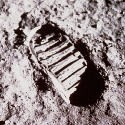 A recent post by Jerry Coyne, Accommodatheism #2: More gratuitous atheist-bashing in an mainstream article on the Creation Museum, called attention to a magazine article, that while good overall, had a kind of jarring passage in the center that was only tangentially related to the rest of the article. As Coyne puts it, it was "a superfluous insertion in an otherwise good piece, a gratuitous solipsism meant only to establish the author's status as 'not one of those damn atheists.' "
A recent post by Jerry Coyne, Accommodatheism #2: More gratuitous atheist-bashing in an mainstream article on the Creation Museum, called attention to a magazine article, that while good overall, had a kind of jarring passage in the center that was only tangentially related to the rest of the article. As Coyne puts it, it was "a superfluous insertion in an otherwise good piece, a gratuitous solipsism meant only to establish the author's status as 'not one of those damn atheists.' "
The article in question is Were There Dinosaurs on Noah's Ark?, by Jeffrey Goldberg. It is a fairly good critique of Ken Ham's Creation Museum in Kentucky, and the world-view that guides Answers in Genesis and similar evangelical Christians. However, there was one passage that just didn't belong, quoted below.
My sympathies, by the way, do not lie entirely where you might think. I find atheism dismaying, for Updikean reasons ("Where was the ingenuity, the ambiguity ... of saying that the universe just happened to happen and that when we're dead we're dead?"), and because, in the words of a former chief rabbi of Great Britain, Jonathan Sacks, it is religion, not science, that "answers three questions that every reflective person must ask. Who am I? Why am I here? How then shall I live?" Like Ken Ham, I am appalled by the idea, as expressed by Richard Dawkins, that "the universe we observe has precisely the properties we should expect if there is, at bottom, no design, no purpose, no evil, and no good, nothing but blind, pitiless indifference."
It's not just Goldberg who says or writes things like this. I hear sentiments like this all the time, so I think it's worth a substantive response. There are so many objectionable aspects worked into that short paragraph. I'll just work through them sequentially.
I find atheism dismaying, for Updikean reasons ("Where was the ingenuity, the ambiguity ... of saying that the universe just happened to happen and that when we're dead we're dead?")...
Reality doesn't care one lick whether you're dismayed or not. Reality doesn't care, period. Reality is what it is. This objection about atheism being 'dismaying' is merely an argument from consequences. I've used this example before, but I certainly find the Holocaust 'dismaying', to say the least, but I don't doubt that it occurred because of that. As a mature adult, you just have to face up to reality, no matter what the consequences.
Let me parse this statement a little further - "the universe just happened to happen". First of all, no one's really yet sure where the universe came from. Evidence so far points to the Big Bang, but anything before that, if there even was anything, is still conjecture. So, no one can even say "the universe just happened to happen", since no one's really sure where the universe came from in the first place. But the bigger question I think Goldberg is getting at is why there's something rather than nothing, because even if we were to discover what caused the Big Bang, the question would just shift to where that cause came from. But in this sense, how does religion add anything? It's just postulating one possible cause. Even if it were true that Yahweh created the entire universe ex nihlo, the question then shifts to what created Yahweh. And if the religionist's answer is 'Yahweh just happened to happen', then how is that any more satisfying than Goldberg's objection to atheism?
On to the next part of that statement - "when we're dead we're dead". I've actually given this a lot of thought (usually when I'm occupied with mindless chores like raking leaves). If consciousness is an emergent property of matter, as seems to be the most likely scenario, it's still the case that no one really understands how it all comes about. What if you were to take a person's brain, throw it into a blender, use a Star Trek replicator to reconstruct all that raw material into an exact copy of what the brain was like previously, stick it back into the person's skull, and revive them? Would the experience of sensation be the same as before? Would it be a different sense of self, but acting just like the original person? Does it depend on getting the duplication exactly the same as before atom for atom, or does it only matter if the same elements get put in the same places (carbon atom here, oxygen atom here, etc.)? What if you reconstruct the brain differently to match somebody else's brain? Is it the same sensation of experience but with a different personality and memories? Of course, this thought experiment is a little unrealistic in that there's no technology to scan or reconstruct a brain in that level of detail, nor revive a person after such a procedure, but moving on to something real, what happens after a person dies and decomposes, and those atoms in their brain get incorporated into the brains of new organisms? Is this in any way a continuation of the previous consciousness, even though the personality and memories would be entirely different? (BTW, I've coined this concept as 'materialistic reincarnation' in my own head. I'd be interested if anyone knows of a better term or of people who have already gone down this thought path.) Just because most atheists don't believe in souls doesn't mean we don't give any thought to questions like this.
in the words of a former chief rabbi of Great Britain, Jonathan Sacks, it is religion, not science, that "answers three questions that every reflective person must ask. Who am I? Why am I here? How then shall I live?"
This is a false dichotomy. Even if science can't answer those questions subjectively like Goldberg and many others might like (and it can't since science deals in the objective), why should we automatically assume that religion can answer them adequately?
For one thing, there are many mutually contradictory religions, with their own unique answers to these questions. Since at least some of those religions must necessarily be mistaken, then their answers to Sacks' big three questions could also be mistaken. It does no good to try to answer questions like this when your starting from a false foundation. If Yahweh is only a myth, why worry about his dictates any more than those of Zeus?
But even if any religion were true, it's a stretch to think that they would provide meaningful answers to these questions. As I pointed out above, even if Yahweh created the universe, you're left with the problem of where Yahweh came from in the first place, or why he has the characteristics he has. And if you can't answer that, how can you invoke Yahweh to give more than a superficial answer to the question of 'Why am I here?'
There's a very old philosophical point that illustrates the problem with this, the Euthypro Dilemma. It was posed by Plato in Classical Greece, back in the first century BCE, "Is the pious loved by the gods because it is pious, or is it pious because it is loved by the gods?" This is usually brought up in relation to morality, and illustrates the inadequacy of ideas such as Divine Command Theory. Following a god's commands is merely obedience, not true morality. Even if a god was real, that only tells you how to act to avoid the god's judgement, not how to be moral.
Like I said up above, limiting your choices to science and religion in this discussion is a false dichotomy. There's another human endeavor with contributions to the topic - philosophy. Try reading about secular humanism for a way to live ethically and morally without relying on religion.
...I am appalled by the idea, as expressed by Richard Dawkins, that "the universe we observe has precisely the properties we should expect if there is, at bottom, no design, no purpose, no evil, and no good, nothing but blind, pitiless indifference."
Similar to the first statement I critiqued, this is another argument from consequences. Being appalled by an indifferent universe doesn't mean the universe will suddenly start caring about you.
Conversely, now that I've become an atheist, I find this view of the universe more appealing than a theistic view (not that this is a reason to be an atheist, or else I'd be just as guilty of arguing from consequences). If you consider the problem of evil, and all the bad things that happen to good people, it makes you wonder about the nature of any supposed god. I mean, just look at the Ebola outbreak going on right now, and all the suffering it's causing. Understanding that it's a random occurence, and that the people being afflicted are just victims of bad luck, is much easier to take than thinking that some god is letting it all happen, or worse, causing it, and choosing which particular people are in for the worst suffering. And if you consider the Bible to be an accurate portrayal of Yahweh, with both the Old Testament atrocities and the New Testament invention of Hell, then a universe of 'pitiless indifference' is much more comforting than one being ruled by such a petty, vindictive, capricious and cruel being with limitless power.
---
Overall, Goldberg's article was good. But that one particular paragraph was horrible. It was basically one big argument from consequences, but without really thinking through the consequences as applied to religion. There are tough philosophical questions that we all try to deal with, but there's no reason to assume that religion can answer them.
More Info:
I've dealt with many of these issues previously, so if you're interested, you can read more of my thoughts through the links below. Yes, some of what I wrote here is similar to what I've written in the past, but I just couldn't help myself.
 Today is traditionally celebrated as Columbus Day, but Columbus really was a horrible excuse for a human being. It's not just the myth about him proving the world was round, or lucking into finding a continent that nobody knew existed, but his horrible, horrible treatment of the natives and even the Spaniards in the first Spanish colony in the Americas.
Today is traditionally celebrated as Columbus Day, but Columbus really was a horrible excuse for a human being. It's not just the myth about him proving the world was round, or lucking into finding a continent that nobody knew existed, but his horrible, horrible treatment of the natives and even the Spaniards in the first Spanish colony in the Americas.


 Well, I have some good news to report, as a follow-up to an entry I'd written last week,
Well, I have some good news to report, as a follow-up to an entry I'd written last week,  This week, you get a bonus Friday Bible Blogging entry in the middle of the week. The main entry that I'll post on Friday covers Psalms 111 through 120, but it brings me to a slightly controversial milestone of sorts that I decided was worth covering in its own entry - the central verse of the Bible.
This week, you get a bonus Friday Bible Blogging entry in the middle of the week. The main entry that I'll post on Friday covers Psalms 111 through 120, but it brings me to a slightly controversial milestone of sorts that I decided was worth covering in its own entry - the central verse of the Bible.